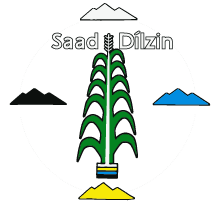Introduction to Navajo Questions
Any competent speaker of any language will be able to form questions. This resource is a combined grammar and lexicon of Navajo questions. We provide a description of three kinds of questions along with glossed examples and audio recordings of them. We think this resource will be useful to students and teachers of this language, and to professional linguists within and outside Navajo communities.
We distinguish three distinct kinds of questions: Yes/no questions, Content Questions, and Alternative Questions. We treat Tag Questions as a subtype of Yes/no questions. For this project we draw on previous work by Fernald & Perkins (manuscript), Young & Morgan (1987), Young, Morgan & Midgette (1992), and others cited in References [link].
| Da’ | Na’nízhoozhígóó | díníyá? |
| Q | Gallup-to | 2-go.F |
| Are you going to Gallup? | ||
| Mary | ha’át’íí | nayiisnii’? |
| Mary | what | 3-3-buy.P |
| What did Mary buy? | ||
| ’Atsį́’ísh | ’éí | doodaii’ | łóó’ísh | nínízin? |
| meat-Q | TOP | or | fish-Q | 3-2-want.NI |
| Do you want meat or fish? | ||||
Example (1) is a yes/no question, which has ‛yes’ or ‛no’ as an answer. Questions like this are
used to ask whether a particular statement is true or not. In this example, the statement being
asked about is Na’nízhoozhígóó díníyá, which means ‛You are going to Gallup’
Content questions, like example (2), do not have simply ‛yes’ or ‛no’ as an answer.
Rather than supplying a statement and asking whether it is true or not, they have the effect of
providing a statement with some missing information, and they ask what that information is. In
(2), the idea is that Mary bought something, and the question asks what that something is. Alternative questions present the addressee with a choice between two or more options.
Note that the English gloss in example (3) can be understood as either a yes/no question (if the
intonation is rising on fish) or an alternative question (if the intonation is falling on fish). In
Navajo, the sentence is an alternative question for which the appropriate answer will indicate
which one of the choices is desired.
Glossing conventions and a note on morphology are here [link].
An example search has returned 50 entries
’Áłah ’aleehdi hastiin léi’ t’óó yááłtih yiits’a’.
meeting-at man INDEF just 3-talk.Prog 3-be.heard.I-ę́ę+-dą́ą́’ (yę́ędą́ą́’)
-na’
beside, at one’s side, in place of, waiting for
bookmarkbik’ídóhdis
3DO-2dpl-wrap.it.around.it.ICh’iyáán t’óó ’ahayóí ndi tó ’ádin.
food lots but water 3-none.NICh’į́į́góó ch’ééh tádííyá.
fail in.vain 1-go.PCh’ééh jiyáán hooghangóó dah dii’ągo shee nikihoníłt.
watermelon home-toward up 3-1-move.SRO.P 1-with area-start-rain.PChidíísh bee hólǫ́ doodaii’ ni daats’í chidí nee hólǫ́?
car-Q 3-with 4-exist.NI or you perhaps car 2-with 4-exist.NIDoes s/he have a car or do you have a car?
bookmarkda’
dadiidį́į́ł
pl-3DO-1dpl-eat.it.FDibé doo deeghánígóó ’ałkéé’ ’idíítąądgo hooghanjį’ náákah.
sheep long.way RECP-follow 3-spread.out.NP home-up.to 3-walk.pl.Progdidadołjeeh
pl-3DO-2dpl-start.fire.Idideidiłjeeh
pl-3DO-3dpl-start.fire.IDiné ła’ nizhónígo kéédahojit’į́ danihó’ní, ’áko ndi doo ’ákót’ée da.
people some 3-nice.NI-GO pl-4-3-reside.NI 3-Pl. so but NEG 4-think.CI NEGDíí chizh shá ’ałk’íniishóósh.
this firewood 1-for 3-2-split.IDííshą’ látsíní háádę́ę́’ naa ninídee’?
this-Q bracelet where-from 2-to 3-arrive.PlO.PHa’át’éegishą’ nich’ah nííní’ą́?
where-at-Q 2-hat 3-2-set.down.SRO.PHa’át’éegosh náníldzid?
why-Q 2-fear.IHa’át’éegoshą’ t’áadoo ’azee’ál’į́į́góó nisíníyáa da?
why-Q NEG hospital-to 2-go.sg.P NEGHa’ąądi dibé bighan.
areal-other.side sheep 3-corralhadííníłbįįd
3DO-2-fill.something.up.with.it.Pfill something up with it, 2nd person singular
bookmarkHooghan binááshwoł ńt’éé shimá sání shich’ahóóshkeed.
hogan 3-encircling-1-run.Prog past 1-grandmother 1-3-scold.PI was running around the hooghan when my grandmother got after me.
bookmark- Progressive (Prog)find in Navajo Verb Modes
- binááshwoł run aroundfind in Navajo Verb Modes
- ńt’éé’ relates to past timefind in Navajo Adverb Lexicon
- Perfective (P) (yi, ni, si, yi-∅)find in Navajo Verb Modes
- hoshishkeeh scoldfind in Navajo Verb Modes
- -ch’a scoldfind in Navajo Postposition Lexicon
hááłgizh
3DO-1-cut.it.out.PK’ad niba’ sédáa dooleeł.
now 2-wait 1-sit.SPN FUTKin Łánídi daats’í ’éí doodago Bee’eldííldahsinildiísh naniná?
Flagstaff-at perhaps or Albuquerque-at-Q 2-go.around.CIMary hádą́ą́’sh ’ólta’dę́ę́’ nádzá?
Mary when-past-Q school-from 3-return.PNa’nishkaadgo nídíshchííyaagi hanáshyį́į́h ńt’éé’ ’iiłhaazh lá, t’ah nít’éé’ shilééchąą’í ch’ééshinísid.
1-herd.I-GO pinetree-under-at 1-rest.I past 1-slept.P DISC all.of.sudden 1-dog 1-woke.up.PWhen I was out herding I was resting under a pinetree and I went to sleep but suddenly to my surprise my dog woke me up.
bookmark- Imperfective (I) (∅, ni, si, yi-∅)find in Navajo Verb Modes
- na’nishkaad herd, go out herdingfind in Navajo Verb Modes
- -yaa under, beneath, downfind in Navajo Postposition Lexicon
- location
- -gi atfind in Navajo Postposition Lexicon
- Imperfective (I) (∅, ni, si, yi-∅)find in Navajo Verb Modes
- ńt’éé’ relates to past timefind in Navajo Adverb Lexicon
- hanááshyį́į́’ restfind in Navajo Verb Modes
- Perfective (P) (yi, ni, si, yi-∅)find in Navajo Verb Modes
- ’iishháásh sleepfind in Navajo Verb Modes
- t’ah ńt’éé’ all of a suddenfind in Navajo Adverb Lexicon
- Perfective (P) (yi, ni, si, yi-∅)find in Navajo Verb Modes
- ch’ééníssííd awaken him/herfind in Navajo Verb Modes
Na’nízhoozhígóósh díníyá?
Gallup-to-Q 2-go.SPNádí daats’í ’éí doodaii’ nideezhí daats’í bááh ’íidoolííł?
older.sister perhaps or younger.sister perhaps bread 3-make.FNáhookǫsdę́ę’go níłch’igo ’ayóo deesk’aaz.
north.from-GO breeze-GO very cold.SPNnideizlá
pl-3DO-3dpl-carry.a.ropelike.thing.around.Pcarry a ropelike thing around, 3rd person plural
bookmark



